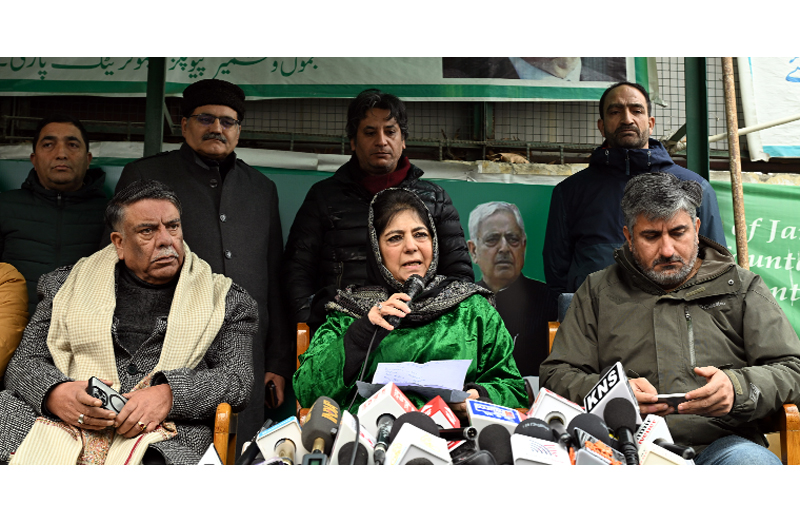Suhail Bhat
SRINAGAR, Dec 18: Mehbooba Mufti, the former Chief Minister and president of the Peoples Democratic Party (PDP), called for an independent Environmental Impact Assessment (EIA) prior to the initiation of the proposed Rajouri-Baramulla National Highway project and the expansion of railway lines in Kashmir. During a press conference at the PDP headquarters, Mufti raised concerns about the potential environmental and economic ramifications of these projects.
Mufti highlighted the importance of sustainable development that protects local communities’ livelihoods, stating, “We appreciate infrastructure development in Jammu & Kashmir, but it must not come at the expense of our environment and our people’s means of living.”
She specifically criticized the ₹300 crore Rajouri-Baramulla Highway project for its route through ecologically sensitive areas in the Pir Panjal range and beautiful tourist spots like Yousmarg, Doodhpathri, and Kellar Shadimarg. Mufti warned that such projects, if not managed responsibly, could lead to ecological disasters similar to the recent crisis in Joshimath, Uttarakhand.
The highway project, which is under the management of the Border Roads Organisation (BRO), parallels the existing Mughal Road. Mufti questioned its necessity, arguing that it duplicates existing connectivity while endangering the environment. “We have already heavily invested in the Mughal Road to establish links between Poonch, Rajouri, and Shopian. What is the purpose of a parallel highway, if not to burden our environment and waste public funds?” she asked.
The proposed route would traverse the districts of Poonch, Shopian, Pulwama, Budgam, and Baramulla, raising concerns over deforestation, land degradation, and a heightened risk of landslides, which could jeopardize the region’s biodiversity.
Drawing parallels to the Joshimath incident, Mufti emphasized the risks associated with ill-planned infrastructure in delicate Himalayan ecosystems. “We cannot afford to repeat the mistakes seen in Joshimath, where unchecked development led to towns sinking and livelihoods collapsing,” she warned.
She called for a transparent EIA that includes local communities, environmental specialists, and other relevant stakeholders to ensure well-informed decision-making. “This project poses a threat to livelihoods reliant on ecotourism and horticulture in areas like Yousmarg and Doodhpathri, which serve as crucial economic lifelines for countless families,” she cautioned.
Additionally, Mufti criticized the government’s plan to establish 30 satellite townships along the Srinagar Ring Road, which would require about 15,000 acres of valuable agricultural and horticultural land. She noted that this initiative would particularly affect farmers in Budgam district, where 17 villages could lose fertile land.
Regarding railway expansion, Mufti expressed her fears about the ecological damage linked to the proposed doubling of the Baramulla-Banihal line and new tracks through Shopian and Pahalgam. “While enhancing connectivity is vital, it must not come at the severe expense of Kashmir’s environment and the livelihoods of its people,” she stated.


Leave a Reply